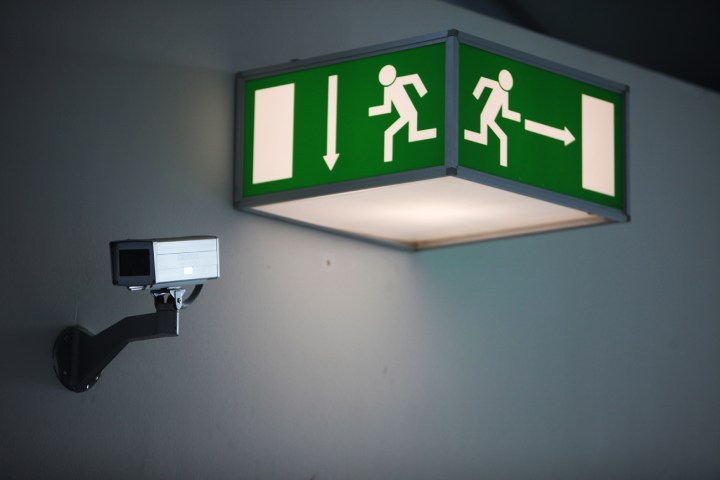Politics, South Africa, World
If you’re paranoid, you’ve good reason to be

All over the world, including South Africa, the power of securocrats is increasing. The ominous difference here, writes CHRIS GIBBONS, is that we’re about to get the new Protection of State Information Bill.
Imagine a country in which every single international telephone call, email or any other kind of transaction is monitored, recorded and stored forever. A country in which secret military tribunals can impose the death penalty on sealed, secret indictments. A country that bullies its allies into lopsided extradition treaties, which compel those same allies into handing over suspects without the country having produced any evidence.
This country exists. It styles itself “Land of the Free, Home of the Brave.” It is the United States of America, and that motto needs to be re-written: “Land of the Not-So-Free, Home of the Extremely Paranoid.” Nor can we trace this paranoia directly to 9/11, though it has intensified a great deal since then.
I’ll come back to the US in a moment, but let’s imagine another country. This is one where a new prime minister was brought to power very narrowly. One of the major brokers of this deal turned out to be a secret government source for a major foreign power. The country is Australia, the prime minister is Julia Gillard, the power broker’s name is Mark Arbib and the foreign power is the US. Arbib has just resigned from Gillard’s cabinet, by the way.
Or we could imagine another country, famed for its justice system and freedom of speech. It’s the UK, which is contemplating secret court hearings to protect intelligence shared by the US and other allies. Like the US, it’s also contemplating a major increase in state snooping on the internet. Prime Minister David Cameron wants a dramatic increase in his state’s powers to read emails, check which websites you’ve been browsing and, most notably, find out what you’ve been up to on Facebook and Twitter.
And so the list goes. We are clearly not alone. You might even be forgiven for thinking that our ministry of state security, by increasing the powers afforded to its spooks, is merely trying to keep up with the neighbours. Two of our major allies in the Brics movement, Russia and China, are of course legends in this dubious arena.
So what’s going on?
The explanation lies in the fact that the modern spy, be he or she American or British or South African, is not very competent. In the mid-60s, I was taught by a man who spoke not only flawless French, but also Arabic. Not just any old Arabic, either, but 12 North African dialects. He had been “something in Intelligence” during World War II, and had operated undercover behind enemy lines for extended periods of time.
In the same vein, think of TE Lawrence a generation earlier. Fast forward to the 1990s, when I met a British Foreign Office expert on all things Russian, but especially Chechnya. He, too, spoke the local language intimately, but instead of posting him to Moscow, he’d been sent to Pretoria.
Our American friends, by their own admission, are the worst. We know that at the time of 9/11, the CIA had no Arabic speakers on its books. We also know that less than 20% of Americans ever travel outside their own borders. Insular, inward-looking, the average American knows very little about the rest of the world.
All of which makes it just so much easier to sit in a cosy office trawling the internet, intercepting satellite transmissions and tapping phone calls. The Americans have been doing it for years and, as is their wont, have a suitable acronym for it – ELINT – electronic intelligence.
It’s a beguiling idea: all these terrorist types chatter to each other incessantly on their cell phones or send each other emails with the details of their dastardly plots, and all the spooks have to do is intercept the communication, and – voilà! – the game is up. Plus you get to go home at five o’clock and nobody shoots at you.
It’s a spectacularly inefficient method of capturing intelligence, but that has not deterred America’s National Security Agency from building a multi-billion dollar data capture and storage centre in a remote town called Bluffdale, in Utah. This is where all the international transactional information will be stored. All of it, including every email home from US troops in Afghanistan, every phone call home to a loved one, every credit card transaction, everything.
As expert and author James Bamford explained in a recent edition of Wired magazine, the NSA also now routinely snoops on American citizens in their own country. Much of this is illegal but Bamford notes that didn’t stop the NSA back in the late 1960s, when President Richard Nixon ordered it to spy on anti-Vietnam war protesters, and it doesn’t now. Bamford also reminds us that, despite all of this information and storage, the authorities failed miserably to capture either the 2009 Underwear Bomber or the 2010 Times Square bomber.
There are, however, crucial differences between what’s happening elsewhere in the world and here, with the impending Protection of State Information Bill. Time and again, as the American media and writers like Bamford expose the dark underbelly of their society, politicians there have been forced to stem the abuses. Post-Nixon laws were passed in this area in the 1970s and Congress knocked back super-spying proposals as recently as 2003.
In the UK, Cameron has backed away from the new snooping legislation, with reports suggesting it could have split his coalition. In Australia, public outrage caused Mark Arbib to fall on his sword.
Here, there is ample evidence that the spooks have become inseparable from the ruling ANC. Remember for a moment the Hoax Email scandal and the Browse Mole Report? After much investigation into those affairs, it became clear that factions within the intelligence community were playing games related to a power struggle within the ANC. What was never cleared up, though, was whether or not the factions were operating independently or at the behest of political leaders with their own agendas.
Whereas we do have multi-party oversight of the country’s intelligence services, via the Joint Standing Committee on Intelligence, appointments to that committee are made by the president himself. Thus, a political party might nominate a representative to sit on the JSCI, but if that person doesn’t meet with presidential approval his or her appointment would be knocked back.
Seats on the JSCI are also allocated proportionally, which means the ANC has a clear majority. As we have seen repeatedly elsewhere, party loyalty takes precedence over executive accountability. All of which means that if our spooks are being used as political tools, there is little or no chance that either they or their masters will be brought to account.
This also explains why the ANC’s politicians have voted so enthusiastically in favour of the POSIB. This includes those MPs affiliated to Cosatu, which says it’s opposed to the bill but clearly isn’t. And it may also explain why state security minister Siyabonga Cwele is so aggressive in his defence of the new legislation: it’s a fair assumption that he is being told what to think and do by members of his own department.
As we have seen repeatedly in the USA, intelligence operatives hold themselves to be above the state. Here it is no different. It would also seem that our spooks are not much cleverer than the Americans. Despite their extensive resources, they were apparently unable to advise the minister that his own wife was involved in drug smuggling.
One thing you can be certain about: the bigger the state’s security apparatus, the less efficient it will be. The more time these good people spend behind their desks trying to decipher and decode ELINT, the less they will discover. In turn, that will lead to demands for even more money, with bigger and better machines that will produce less and less real intelligence.
South Africa’s problem is that the Protection of State Information Bill will make writing about and exposing this inefficiency even more difficult than it already is. The spooks are in control. DM






 Become an Insider
Become an Insider